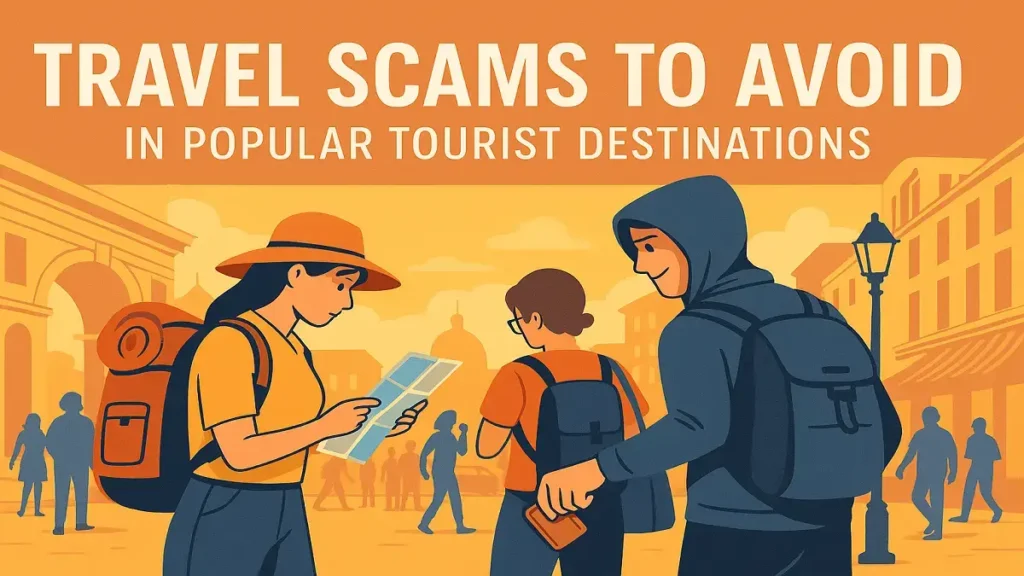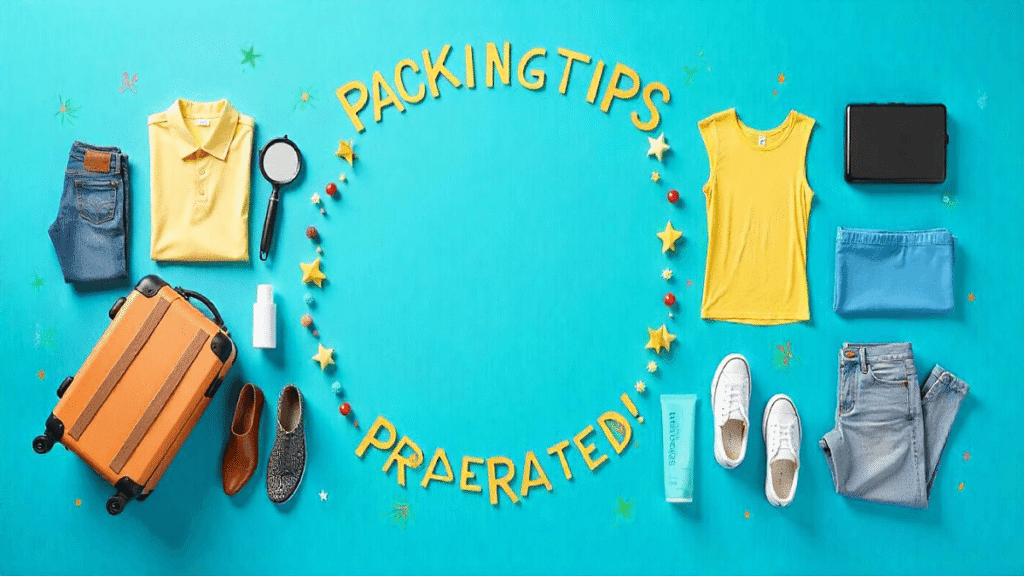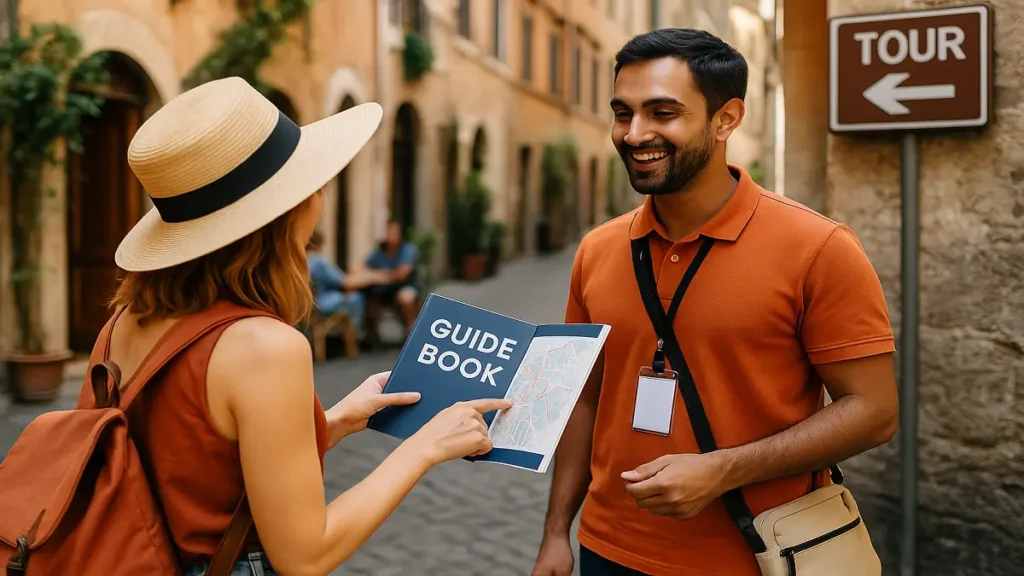Travel Scams to Avoid in Popular Tourist Destinations
Picture this: you’re wandering through the charming streets of Paris, soaking in the magical atmosphere, when suddenly a friendly local approaches you with what seems like an innocent gesture. Before you know it, you’re caught in a well-orchestrated scam that could cost you money, time, or even worse—your entire vacation experience. While travel opens doors to incredible experiences and unforgettable memories, staying informed about common scams is essential to ensure your adventures remain positive and safe.

Travel scams have evolved significantly in recent years, with scammers becoming increasingly sophisticated in their approaches. According to recent research, 1 in 3 people have been scammed when booking or taking trips, with a third losing $1,000 or more. From bustling European capitals to exotic Asian markets, tourist destinations worldwide harbor clever con artists ready to prey on unsuspecting visitors. The good news? Most scams follow predictable patterns, and with the right knowledge, you can spot and avoid them before they impact your journey.
The Notorious Bracelet Scam (Paris, Rome, Barcelona)
One of the most widespread scams targeting tourists across Europe is the infamous bracelet scam, particularly prevalent in cities like Paris, Rome, and Barcelona. This scam typically begins with a friendly approach from someone asking where you’re from, followed by seemingly innocent conversation. The scammer then attempts to place a bracelet around your wrist, often claiming it’s a “friendship symbol” or that “it’s offensive if you don’t take it”.
The key to this scam’s effectiveness lies in its psychological manipulation. Once the bracelet is on your wrist, the scammer demands payment, often becoming aggressive if you refuse. In some cases, multiple accomplices surround the victim, creating an intimidating situation. The scam operates similarly to pickpocketing schemes, as scammers may steal your belongings while you’re distracted.
How to avoid it: The most effective defense is to completely ignore these approaches. Don’t engage in conversation, and if someone tries to put anything on you, firmly say “No, thank you” and walk away immediately. If a bracelet is forced onto you, remove it immediately, drop it on the ground, and leave without apologizing or engaging further.
Taxi Overcharging and Transportation Scams
Transportation scams represent one of the most common types of fraud travelers encounter worldwide. These scams take various forms: drivers claiming their meters are broken, taking unnecessarily long routes, charging inflated flat rates, or demanding excessive fees for luggage. The problem is particularly acute at airports and tourist hotspots where unlicensed drivers prey on newly arrived visitors.
Research has shown that taxi overcharging affects travelers globally, with some studies documenting systematic patterns of fraudulent behavior. In major tourist destinations, drivers often target visitors who appear unfamiliar with local geography and currency.
Prevention strategies: Always research standard taxi fares before your trip and use reputable ride-hailing apps when available. Insist on using the meter or agree on a fixed price before starting your journey. For airport transfers, use official taxi counters or pre-arranged hotel transfers rather than accepting offers from random drivers approaching you.
Fake Police Officer Scams
The fake police officer scam has become increasingly sophisticated, with perpetrators wearing convincing uniforms and carrying official-looking identification. These imposters typically approach tourists in popular areas, claiming to need to check wallets for counterfeit money, inspect bags for drugs, or verify travel documents. They may accuse travelers of minor violations and demand immediate “fines” or bribes.
This scam is particularly effective because it exploits travelers’ natural inclination to comply with authority figures. Recent reports indicate this scam is especially common in cities like Amsterdam, Prague, Mexico City, and Egypt.
The fake police officer scam has become increasingly sophisticated, with perpetrators wearing convincing uniforms and carrying official-looking identification. These imposters typically approach tourists in popular areas, claiming to need to check wallets for counterfeit money, inspect bags for drugs, or verify travel documents. They may accuse travelers of minor violations and demand immediate “fines” or bribes.
This scam is particularly effective because it exploits travelers’ natural inclination to comply with authority figures. Recent reports indicate this scam is especially common in cities like Amsterdam, Prague, Mexico City, and Egypt.
How to protect yourself: Legitimate police officers rarely conduct random street checks without clear cause and additional police presence. Always ask for official identification and badge numbers. If confronted by supposed officers, remain calm and suggest going to the nearest police station to resolve any issues. Never hand over your passport or wallet on the street.
Legitimate police officers rarely conduct random street checks without clear cause and additional police presence. Always ask for official identification and badge numbers. If confronted by supposed officers, remain calm and suggest going to the nearest police station to resolve any issues. Never hand over your passport or wallet on the street.
ATM Skimming and Card Fraud
ATM skimming has become a significant threat to travelers, with criminals using sophisticated devices to steal card information and capture PINs. These devices are often difficult to detect, as they’re designed to blend seamlessly with legitimate ATM hardware. Skimmers can also set up fake Wi-Fi networks near ATMs to capture additional personal information.
The rise of card cloning technology has made this threat even more serious, with some attacks being virtually undetectable to banking systems. Fraudsters target busy tourist areas where people are more likely to be distracted or unfamiliar with local ATM designs.
Safety measures: Use ATMs located inside banks or well-monitored, well-lit areas. Before inserting your card, inspect the card reader and keypad for any loose, unusual attachments, or anything that looks different from other machines. Cover your hand when entering your PIN, and regularly monitor your bank statements for unauthorized transactions.
The "Closed Attraction" Con
This scam involves locals approaching tourists near major attractions, informing them that the site is “closed” due to holidays, cleaning, or special events. The scammer then helpfully suggests alternative attractions—usually shops, restaurants, or tours where they receive commissions. This scam is particularly common in cities like Bangkok, Delhi, and Cairo.
Variations include taxi drivers claiming your hotel is closed and offering to take you to a “better” alternative, or suggesting that popular restaurants or attractions have moved to new locations.
How to avoid it: Always verify attraction hours independently through official websites or by calling directly. Walk up to the attraction entrance yourself to confirm its status rather than relying on unsolicited advice from strangers. If someone insists an attraction is closed, politely decline their alternative suggestions and check for yourself.
Fake Booking Sites and Travel Agencies
With the rise of AI technology, scammers have created increasingly sophisticated fake booking websites that closely mimic legitimate travel platforms. These sites offer attractive deals but either provide fake confirmations or charge for non-existent accommodations and services. According to recent data, over £15 million was lost to holiday booking scams between April 2022 and April 2023, marking a 41% increase from the previous year.
Romance investment scams have also emerged, where fraudsters build fake online relationships with potential travelers before convincing them to invest in fraudulent travel-related cryptocurrency schemes.
Protection strategies: Always book through verified, reputable websites or directly with airlines and hotels. Verify website URLs carefully and look for secure connections (https). Be extremely skeptical of deals that seem too good to be true, especially those received through unsolicited emails or social media.
Currency Exchange and Money Scams
Currency exchange scams take multiple forms, from street exchangers using sleight of hand to shortchange tourists, to vendors switching similar-looking bills during transactions. These scams are particularly effective in countries with currencies that feature similar-colored denominations.
Money changing scams often involve clerks quickly switching notes during the exchange process, leaving tourists with less money than they paid for. Some scammers also use damaged or counterfeit bills that are difficult to spend later.
How to stay safe: Only exchange money at authorized counters in banks, airports, or licensed exchange bureaus. Always count your money carefully in front of the clerk before leaving. Avoid accepting torn, worn, or damaged notes, as these can be difficult to use later.
Tour Guide Impersonators and Activity Scams
Fake tour guides are a growing problem in many tourist destinations, with scammers approaching visitors near popular attractions and offering “special” or “VIP” tours. These individuals often demand upfront cash payments before disappearing or providing substandard experiences. Some operate in organized groups with official-looking badges and materials.
The proliferation of online booking platforms has also led to an increase in fake tour operators advertising non-existent activities or charging inflated prices for poor-quality experiences.
Prevention tips: Only book tours through reputable operators with verified reviews and official licenses. Verify guide credentials and certifications before making any payments. Research tour operators thoroughly and look for physical office addresses and professional associations.
Gift and Distraction Scams
Beyond the bracelet scam, numerous other “gift” scams operate worldwide. These include the “sauce trick” where someone spills something on you and offers to help clean it while accomplices pickpocket you, fake petition signers who surround and distract victims, and street performers whose accomplices work the distracted crowd.
These scams all rely on the same principle: creating a distraction while accomplices steal valuables or put victims in compromising positions.
General Travel Safety Guidelines
Research and Preparation: Before traveling, research common scams specific to your destination. Understanding local customs and typical prices helps you identify suspicious situations more easily.
Secure Your Belongings: Use hotel safes for important documents and excess cash. Carry only what you need for the day, and consider using hidden money belts or zippered cross-body bags.
Stay Alert and Trust Your Instincts: If something feels wrong, trust your gut instincts. Maintain situational awareness, especially in crowded tourist areas where pickpockets operate.
Use Technology Wisely: Enable banking alerts on your phone to monitor transactions in real-time. Use VPNs when connecting to public Wi-Fi, and avoid entering sensitive information on unsecured networks.
Document Everything: Keep copies of important documents separate from originals. Take photos of your belongings and accommodation details in case you need to report problems later.
Final Words
While the world of travel scams might seem daunting, remember that millions of people travel safely every year without incident. The key to safe travel lies not in paranoia, but in awareness and preparation. By understanding these common scams and following basic safety principles, you can significantly reduce your risk of becoming a victim.
Most importantly, don’t let fear of scams prevent you from experiencing the joy of travel. The vast majority of people you’ll encounter during your travels are honest, helpful individuals who genuinely want to enhance your experience. Stay informed, stay alert, but also stay open to the incredible experiences that await you. With the right knowledge and precautions, your next adventure can be both safe and unforgettable.
Remember: An informed traveler is a safe traveler. Share this knowledge with fellow travelers, and together we can make tourism safer and more enjoyable for everyone.




